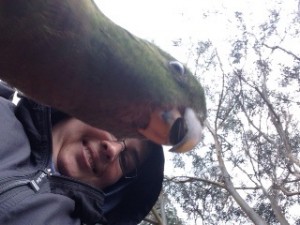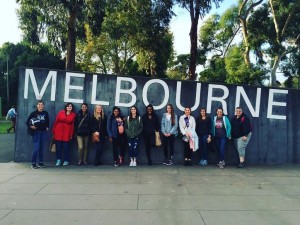By Lisa Mallett
I just went on an epic adventure! At 40- years old I went abroad for the first time in my life and I had an amazing opportunity to study social work in Australia! How cool is that?!
I just spent three weeks studying child welfare and mental health in Melbourne with eleven other students from Ohio State. My reasons for choosing this program were very specific. First, I wanted to learn as much as possible about the social work profession and various systems within Australia in preparation for my move to Western Australia after graduation. Second, my interest is in trauma and crisis intervention, so I saw this as the perfect opportunity to learn from Aboriginal people about their experiences with intergenerational trauma and how they navigate systems in their own country. On both counts I feel like this trip was a huge success.
VACCA was a very important visit for all of us. We learned a ton about Aboriginal history and culture. It is also important to note just how much other child welfare agencies work with VACCA and rely on them for assistance with Aboriginal children that have been brought into the child welfare system. They have developed several programs that help children learn about their culture and develop a strong sense of pride, strength and belonging. We also learned about the huge impact the Apology had on the national consciousness in 2008. This was an official apology by the Australian government for the atrocities inflicted on the Aboriginal people known as the Stolen Generation.
I think the biggest impact VACCA had on my feelings regarding racial and ethnic issues in the U.S. is that we have never as a country apologized to our Native American people for the atrocities we inflicted upon them during colonization. There was an obvious cathartic response in many people in Australia when that apology was made and it really meant something to most Aboriginal people. Backing that apology up with increased social service assistance for Aboriginal people has really had a positive impact on their lives. While there is still much healing to be done in Australia, they have at least started on the path. I wish that we would do this for our original landowners.
Intergenerational trauma is such a complicated and pervasive thing. As professionals, we diagnose someone with depression, anxiety, substance abuse, etc., and then present a prescription for healing that tries to fit our healthcare system model. What can get lost in this approach is the generations of crisis and trauma that a person may come from and how complicated and personal the unraveling of that story becomes as treatment continues.
We now know that trauma literally changes the brain itself. That when exposed to trauma, neglect, or abuse, children will grow up with a brain essentially built to deal with those issues, thus compromising the development of other cognitive functions. Seeing this play out in children and young people in Australia and then seeing their social support responses was extremely beneficial to me. I can now take back my knowledge of other trauma-informed care systems and see how they apply to my experiences with children and adults in the States. I feel like this program has broadened my understanding of trauma in people of all ages and it has certainly served as a catalyst for my current and future work in trauma and crisis intervention.

